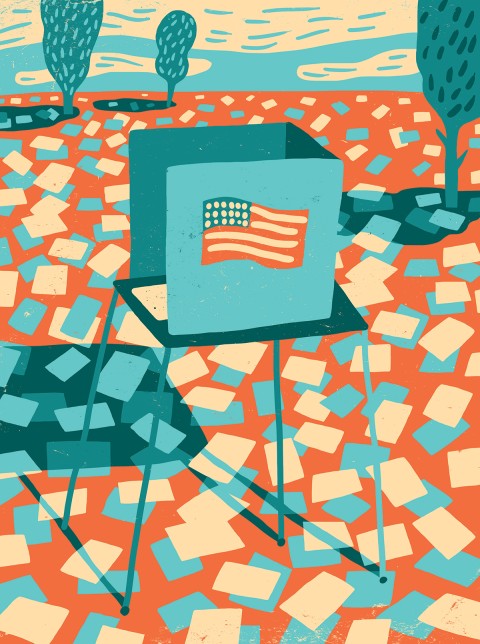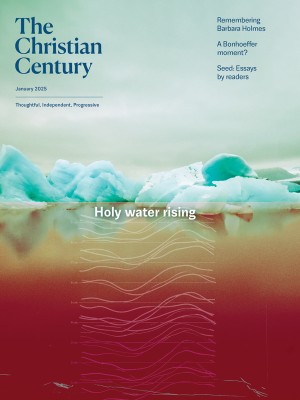
Illustration by Øivind Hovland
“I will be your protector.” In September, the Republican presidential candidate vowed to protect the women of the United States. His campaign was scrambling to make up ground with the voters he’d alienated during his first term as president, when he stacked the Supreme Court with the intention of overturning Roe v. Wade. His problems with women voters went beyond the reproductive rights we lost when the court did in fact overturn Roe. He’d been convicted of sexual assault in a civil trial. He’d boasted of other assaults, cheated on each of his wives, and was convicted of 34 criminal felony counts in a scheme to cover up hush money paid to a woman during his first campaign. This made his offer to be the protector of women all the more ironic. With women’s reproductive rights overturned, the candidate now proclaimed that he, rather than the law, would protect us.
In contrast, his Democratic opponent pledged to protect women by restoring reproductive freedoms through legislation. She pledged to protect democracy by upholding the rule of law. She pledged to protect the borders by signing a bipartisan bill. Though married, she did not seem to be looking to her husband or any man for protection. She let us know that she owned a Glock.
Read our latest issue or browse back issues.
About this time, the theme of protection entered my prayer life. It went deeper than politics. I found three prayers rising, seemingly from my unconscious, often unbidden. First, from Psalm 121:1–2: “I lift up my eyes to the hills—from where will my help come? My help comes from the Lord, who made heaven and earth.”
It matters to me who the president is. But in the words of 2 Timothy, “I know the one in whom I have put my trust” (1:12), and I trust in the one who made heaven and earth, regardless of the outcome of a political election.
In the days when I served a progressive-identified, White suburban congregation, I got in some trouble when I proclaimed from the pulpit that neither candidate would be our savior and that was OK, because we already had one. This was during the 2008 presidential election. I shared most of my congregants’ excitement about the hope and historical significance a certain candidate brought. But I was wary that we were on the verge of idolizing him as a savior.
The trouble was twofold. First, as a historian I remembered many ways the gospel’s mercy, compassion, and witness have been lived out in even the bleakest political landscapes. Regardless of who was elected, we still had a savior and a mission as his servants and followers. Second, the language of a savior was unpalatable to my privileged congregation, most of whom didn’t think they needed a savior because they had the means to save themselves or could rely on a benevolent government to assist them. But history and human experience have taught me not to put too much faith in any political savior or any government’s continued benevolence.
I lift up my eyes to the hills because I have been shaped by Reformed Protestantism’s suspicion of the human will and human kingdoms. I hesitate to think the politicians can keep or enact all their promises. I need only read the gospels to remember the fickleness of crowds and the shifting fealties of human rulers.
I lift up my eyes to the hills because I’m a Native woman with a healthy dose of realism about the protections any legislature, court, or president will afford tribal sovereignty. We must sustain our cultures and traditions—regardless of whether the government protects us, betrays us, or just leaves us alone.
My savior and protector lived amid imperial rule in an occupied land and refused to look to the regional governor to be his protector. Instead, he placed himself in the hands of the one he called Father. He refused to protect himself or others with a sword and would not have relied on a Glock.
Meditating on Christ’s parabolic protection, a second prayer rose in me. It’s from the Presbyterian Book of Common Worship: “You alone are good and holy. Purify our lives and make us brave disciples. We do not ask you to keep us safe, but to keep us loyal, so we may serve Jesus Christ, who, tempted in every way as we are, was faithful to you.”
I prayed that no matter what happened in the aftermath of the election, I would know how to be faithful, brave, and loyal to the gospel. I meditated on Christ walking barefoot and unarmed to the cross.
The final prayer rising in me is the earliest known hymn to Mary, “Beneath Thy Protection”: “We fly to your protection, O Theotokos. Do not despise our petitions but deliver us from dangers, only blessed one.” I’ve prayed with an icon of Mary called the Protection of the Theotokos, too. Mary holds a cloth in her arms, suspended between her hands. I imagine it protecting us, cradling us, swaddling us.
I write shortly after the election of a president whose promises of protection I distrust. I don’t know what will be happening when you read this, but the signs are bleak. Today, however, I lift my eyes to the hills. I gaze at my icon of Mary and invoke her protection. I pray to be a brave disciple of the one who did not come to be safe, but to serve.







